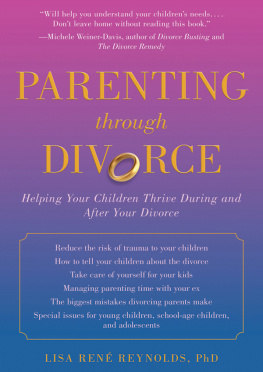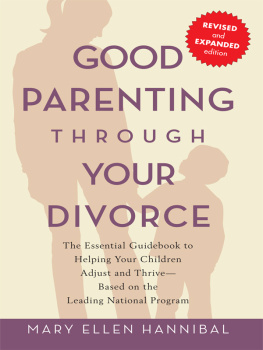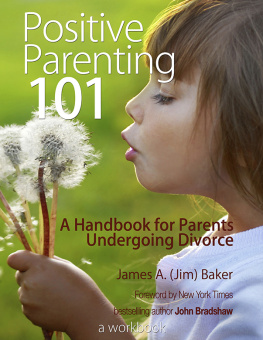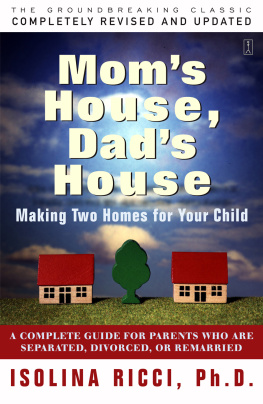Copyright 2011 by Lisa Ren Reynolds
Originally published under the title
Still a Family 2009 by Lisa Ren Reynolds
All Rights Reserved. No part of this book may be reproduced in any manner
without the express written consent of the publisher, except in the case of
brief excerpts in critical reviews or articles. All inquiries should be addressed
to Skyhorse Publishing, 307 West 36th Street, 11th Floor, New York, NY
10018.
Skyhorse Publishing books may be purchased in bulk at special discounts
for sales promotion, corporate gifts, fund-raising, or educational purposes.
Special editions can also be created to specifications. For details, contact the
Special Sales Department, Skyhorse Publishing, 307 West 36th Street, 11th
Floor, New York, NY 10018 or .
Skyhorse and Skyhorse Publishing are registered trademarks of Skyhorse
Publishing, Inc., a Delaware corporation.
www.skyhorsepublishing.com
10 9 8 7 6 5 4 3 2 1
Library of Congress Cataloging-in-Publication Data
Reynolds, Lisa Rene.
Parenting through divorce : helping your children thrive during and after
the split / Lisa Ren Reynolds. Rev. ed.
p. cm.
Previously published under title: Still a family.
Includes bibliographical references and index.
ISBN 978-1-61608-442-4 (pbk. : alk. paper) 1. Children of divorced
parentsUnited StatesPsychology. 2. Divorced parentsUnited States
Psychology. I. Title.
HQ777.5.R49 2011
649'.1dc23
2011035531
Printed in the United States of America
CONTENTS
Chapter 1
The Bad News and the Good News...
and How to Make More of the Good News
Chapter 2
Reducing the Risk of Traumatizing
Your Children
Chapter 3
Taking Care of Yourself ... for Your Kids
Chapter 4
Managing Parenting Time with Your
Children and Ex-Spouse
Chapter 5
Questions That Divorcing Parents Ask
When Only One Parent Is Helping
Children Cope with Divorce
Chapter 6
The Biggest Mistakes Divorcing Parents Make
(and How Not to Make Them)
Chapter 7
Special Issues for Infants, Toddlers,
and Preschoolers
Chapter 8
Special Issues for School-Age Children
Chapter 9
Special Issues for Adolescents
Chapter 10
From the Mouths of Babes
FOREWORD
I n almost thirty-three years as a lawyer, I have represented mothers, fathers, and children in more than a thousand divorce cases and child custody proceedings. I have read many books about divorce and its effects on parents and their children, and I authored one myself. Some of those books were written by lawyers, others by psychiatrists, and still others by psychologists. Many of the books written by lawyers focus on helping the parent or lawyer win custody. Many of those written by psychiatrists or psychologists criticize lawyers and the legal system and encourage parents to negotiate settlements instead of bearing the emotional and financial expense of a trial. Although those books have a place in the libraries of lawyers and judges, they are, for the most part, of limited use to people coming to grips with their own divorce.
Parenting through Divorce, by Dr. Lisa Ren Reynolds, a licensed marriage and family therapist, has a very different bent. Why? Perhaps because Dr. Reynolds, who also teaches parenting-education courses to divorcing parents for the state of Connecticut, has a unique perspective.
Many years ago, the state of Connecticut mandated that all parents getting divorced attend six hours of parenting education, whether there were disagreements about the children or not. Many divorce lawyers cynically believed that the mandate was a therapists' relief bill. However, a look back at over a decade of parenting education shows it has helped. But because six hours in a group class only scratches the surface, it hasn't helped enough.
Parenting through Divorce provides much more help. Those who follow Dr. Reynolds's recommendations will discover that the divorce process need not be as painful for their children as conventional wisdom suggests it is. They will also find that they have become better parents and that their children have a much better chance of living healthy, happy, and successful lives.
discusses the widely reported negative effects of divorce on children. The chapter puts those effects into context and wisely points out that although studies report general effects, there are many children who survive divorce without damage. Three case studies are a prelude to some basic, commonsense rules for avoiding the harm that comes from negative exchanges in front of the children.
focuses on reducing the risk of traumatizing children. It gives helpful advice about topics such as how to tell the children about the divorce, including who should tell them, when to tell them, and what to tell them.
addresses a topic new to divorce primers: the importance of taking care of yourself. I often counsel parents that sometimes divorce can be an emotional war of attrition. I tell clients who are emotionally fragile that help from a mental health professional can be extremely helpful in surviving that war. The chapter discusses this and much more.
offers good advice about how to structure parenting time, as well as what to do if a child wants to spend more or less time with the other parent. Chapters 5 through 10 pose and answer frequently asked questions in divorce, discuss the biggest mistakes divorcing parents make and how to avoid them, and address the age-specific issues children encounter during divorce.
If you want to learn how to win custody, Parenting through Divorce is not the book for you. If you are certain that divorce is about punishing your spouse and minimizing his or her relationship with your children, don't read this book.
If, however, you are seriously concerned about your children and want them to suffer as little as possible from the divorce, this is the book you should read. When you're finished, read it again. Tell your divorce lawyer you've read it, and discuss how following its suggestions could affect your divorce case. (Because each divorce case is different, some of Dr. Reynolds's suggestions may not necessarily be the course to take in particular instances.) Listen to your lawyer's advice, and make educated decisions about how to proceed. Two of those decisions might very well be to give a copy of this book to your ex-spouse and to agree to try to follow its suggestions. You, your spouse, and, most of all, your children, will be very happy that you did.
Gaetano Guy Ferro
Past president of the American Academy of Matrimonial Lawyers
Fellow of the American College of Family Trial Lawyers
INTRODUCTION
I t is eight forty-five on a rainy Saturday morning. Twenty-five new faces stare at me from around a large conference table. Some expressions are hard and resentful, others are sad and anxious. There are more than a few people suffering from the pernicious blend of too much crying and too little sleep. Many look curious, wondering what will happen in this room over the next six hours.
This is how the Parent Education Program (PEP) begins each week. I teach this six-hour mandatory class for Connecticut parents who are seeking a divorce (or separation if the parents were never legally married). My experience in these classes is why I decided to write this book.
Although more states are instituting these mandatory programs for divorcing parents, the six-hour class is never quite adequate for addressing all the struggles the participants present to me. Divorcing parents have so many questions and such a wealth of stories and experience among them; this book focuses on the areas that divorcing parents grapple with most. I address the questions that people ask over and over again in each class. The details may change from family to family, but the core issues are almost always the same among families experiencing a divorce.








